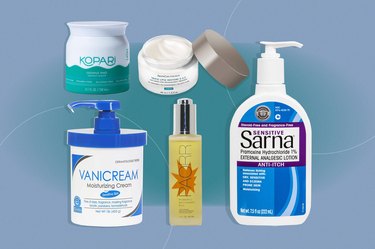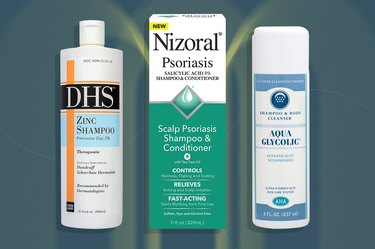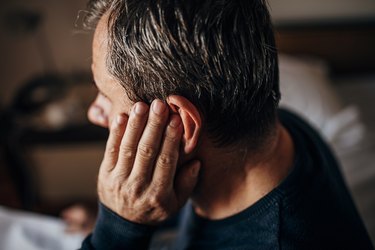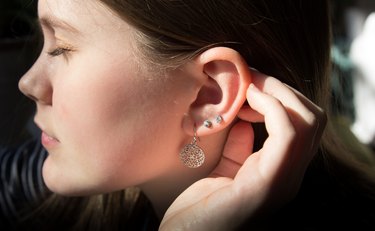
There are few things more maddening than an insistent itch. Especially when said itch occurs in an unreachable place, like the inside of your ear. But why are your ears itchy, exactly?
While most cases of itchy ears aren't a cause for concern, the scratchy sensation can still be insanely annoying and distracting.
Video of the Day
Video of the Day
Here, Philip Chen, MD, FARS, an associate professor of otolaryngology and rhinology at the University of Texas Health Science Center at San Antonio, explains the most common reasons why your ears are so itchy and how to get relief (spoiler: It doesn't involve sticking a cotton swab inside your ear, which can be harmful).
1. You’re Over-Cleaning Your Ears
While it might sound counterintuitive, keeping your ears too clean can be instigating the itchiness. Yep, your seemingly hygienic habit can be hindering your ear health.
Here's why: "The skin of the ear canal makes cerumen (earwax)," Dr. Chen says. "This sticky substance is important in helping to protect the ear from trauma, water damage and even bacteria."
Over-cleaning can remove this protective layer, making it easier for meddling microbes to make their way inside. It may also lead to inflammation, especially if you accidentally break the skin, which invites infection, Dr. Chen says.
All of this can result in irritation, and may be the reason why the insides of your ears are itchy.
Fix it: Earwax usually clears out of your ear canal on its own, according to the Cleveland Clinic. So stop sticking objects in your ears to clean them (we're looking at you, Q-tips). This can push wax deeper into your ear, causing more harm than good.
Instead, gently pat your outer ears dry with a towel after you bathe.
2. You Have Wax Buildup
Everyone knows the saying "too much of a good thing." Well, it holds true when it comes to earwax. While wax can protect your ears, too much of it can cause itching, Dr. Chen says.
Other symptoms of excessive earwax buildup include pain or an odor coming from your ear, according to the Cleveland Clinic, and your ear may feel clogged.
Fix it: Fortunately, "there are many things a person can do to avoid wax buildup," Dr. Chen says.
"A few drops of hydrogen peroxide can break down and loosen excessive wax," which can then be more easily flushed out by the body, Dr. Chen says.
Over-the-counter wax-softening kits and bulb irrigation kits can also be helpful, he says.
On the other hand, avoid cotton swabs (which can unintentionally push wax deeper into your ear), sharp objects like bobby pins (which can tear the delicate skin inside your ear) or ear candles (which can lead to burns), Dr. Chen says.
Tip
Before you try to remove earwax on your own, always talk to your doctor first, as any home remedy could be contraindicated if you have an infection, wear hearing aids or have a hole in your eardrum, Dr. Chen says.
3. You Have an Underlying Skin Condition
Just like the rest of your body, your ear canal is covered with skin. And that makes it equally susceptible to skin issues like eczema and psoriasis, per the Cleveland Clinic.
Indeed, dermatologic conditions can develop inside your ear and result in itchy rashes. So if you're wondering why your ears are hot and itchy, this could be the cause.
Fix it: If you suspect skin issues are the source of your itch, see a dermatologist or ENT specialist. There are many medications to treat dermatological problems like dermatitis and psoriasis (like ear drops or oral steroids), but they need to be tailored to the individual, Dr. Chen says.
4. You Have an Ear Infection
Itchiness could be a symptom of an external ear infection, also known as otitis externa or swimmer's ear, Dr. Chen says.
Otis externa occurs when your ear canal — the opening that runs from your eardrum to the outside of your head — becomes infected due to excessive moisture that builds inside your ear and promotes bacterial growth, per the Mayo Clinic.
This tends to happen to people who spend a lot of time in water, hence why the condition is called swimmer's ear.
You can also develop swimmer's ear by inserting fingers, cotton swabs or other objects into your ear, which may damage the delicate skin in your ear canal and cause an infection, per the Mayo Clinic.
In addition to itching, swimmer's ear can cause pain, drainage and hearing changes, Dr. Chen says.
Fix it: "This should be treated by a medical professional who may give topical ear drops and clear the ear canal," Dr. Chen says.
Don't attempt to self-clean with home remedies for swimmer's ear, as you can inadvertently cause trauma to the ear canal, which will only make the situation worse, he says.
Tip
Wearing a tight-fitting swim or shower cap when you swim or bathe can help you prevent swimmer’s ear in the first place by reducing the amount of water that gets into your ears.
5. You Have a Skin Allergy
If your ears are irritated and scratchy, it might mean you're experiencing a skin-related allergic reaction.
Many things can cause skin sensitivity, including materials in earbuds, soaps, shampoos, makeup and even certain metals in earrings, like nickel, Dr. Chen says.
Indeed, nickel is a common culprit of skin allergies and may trigger itchiness, redness, dry patches or swelling, according to the Cleveland Clinic. These symptoms usually occur where the metal touched your skin.
Fix it: If you're wondering why your ears are itchy, take stock of whether you've used any new products or worn different jewelry recently. Once you determine what's causing the allergic reaction, avoiding contact with it is the best option to decrease ear itching, Dr. Chen says.
If you're having trouble identifying the culprit, an allergist or dermatologist can perform patch testing to help you find the source.
While this kind of itchiness is typically temporary (lasting 12 to 48 hours after contact), over-the-counter steroid creams (like hydrocortisone) and oral antihistamines (like Benadryl) may provide relief in the meantime, Dr. Chen says.
Keep in mind that some people may be sensitive to hydrocortisone, too. If using this kind of product makes your symptoms worse, stop using it and turn to oral antihistamines instead.
6. You Have Seasonal Allergies
The same histamine response that triggers watery eyes and sneezing can also produce a prickly sensation in your ears. Yep, seasonal allergies like pollen or hay fever can send your ears into an itching frenzy.
Fix it: In the short term, you can use a small amount of over-the-counter steroid cream in the ear canal to soothe the itching, Dr. Chen says. But this is only a temporary fix.
That's why it's best to work with your doctor to learn how to manage your seasonal allergies. Treatment options may include oral (or nasal) antihistamines, nasal saline irrigations, nasal steroids and, for people with severe allergy symptoms, immunotherapy (i.e., allergy shots), Dr. Chen says.
Warning
It's rare, but some people can have an extreme allergic reaction to pollens called anaphylaxis, where your throat closes up and makes it difficult to breathe, per the Mayo Clinic. Seek medical care immediately if this happens to you. And if you're receiving allergy shots for seasonal allergies, make sure to stay in your doctor's office for at least 30 minutes after each shot so you can be monitored for an extreme reaction.
7. You Have Irritation From a Hearing Aid
People who wear hearing devices may be more prone to prickly ears. There are several reasons for this, Dr. Chen says, including:
- Hearing aids may contribute to wax or moisture buildup
- Hearing aids are a "foreign object," and their sheer presence inside your ear can produce a strange sensation or tickling
- Hearing aids may contain materials that trigger allergies or dermatitis
Fix it: If your hearing devices are making your ears itchy, tell your hearing aid provider, Dr. Chen says. Your doctor can examine you to ensure your device fits correctly (read: comfortably) and provide guidance on how to keep your hearing aids clean to avoid wax buildup.
Was this article helpful?
150 Characters Max
0/150
Thank you for sharing!
Thank you for your feedback!
Is this an emergency? If you are experiencing serious medical symptoms, please see the National Library of Medicine’s list of signs you need emergency medical attention or call 911.





